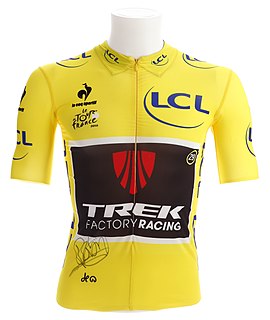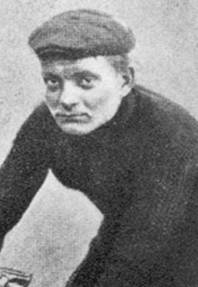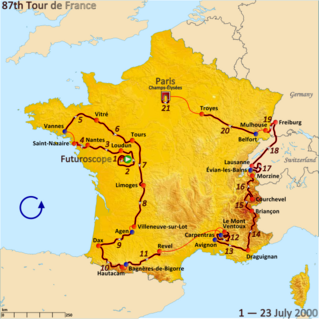
Martinique is an island and an overseas department/region and single territorial collectivity of France. An integral part of the French Republic, Martinique is located in the Lesser Antilles of the West Indies in the eastern Caribbean Sea. It has a land area of 1,128 km2 (436 sq mi) and a population of 364,508 inhabitants as of January 2019. One of the Windward Islands, it is directly north of Saint Lucia, northwest of Barbados and south of Dominica. Martinique is also an Outermost Region (OMR) of the European Union and a special territory of the European Union; the currency in use is the euro. Virtually the entire population speaks both French and Martinican Creole.

The Tour de France is an annual men's multiple-stage bicycle race primarily held in France, while also occasionally passing through nearby countries. Like the other Grand Tours, it consists of 21 stages, each a day long, over the course of 23 days, coinciding with the Bastille Day holiday. It is the oldest of the Grand Tours and generally considered the most prestigious.

The 2001 Tour de France was a multiple-stage bicycle race held from 7 to 29 July, and the 88th edition of the Tour de France. It has no overall winner—although American cyclist Lance Armstrong originally won the event, the United States Anti-Doping Agency announced in August 2012 that they had disqualified Armstrong from all his results since 1998, including his seven Tour de France wins from 1999 to 2005. The verdict was subsequently confirmed by the Union Cycliste Internationale.

The 2003 Tour de France was a multiple stage bicycle race held from 5 to 27 July, and the 90th edition of the Tour de France. It has no overall winner—although American cyclist Lance Armstrong originally won the event, the United States Anti-Doping Agency announced in August 2012 that they had disqualified Armstrong from all his results since 1998, including his seven Tour de France wins from 1999 to 2005; the Union Cycliste Internationale has confirmed this verdict.

The general classification is the most important classification, the one by which the winner of the Tour de France is determined. Since 1919, the leader of the general classification wears the yellow jersey.

The 2005 Tour de France was the 92nd edition of the Tour de France, one of cycling's Grand Tours. It took place between 2–24 July, with 21 stages covering a distance 3,593 km (2,233 mi). It has no overall winner—although American cyclist Lance Armstrong originally won the event, the United States Anti-Doping Agency announced on 24 August 2012 that they had disqualified Armstrong from all his results since 1 August 1998, including his seven Tour de France wins from 1999 to 2005. The verdict was subsequently confirmed by the UCI.

Henri Cornet was a French cyclist who won the 1904 Tour de France. He is its youngest winner, just short of his 20th birthday.

The Martinique national football team represents the French overseas department and region of Martinique in international football. The team is controlled by the Ligue de Football de la Martinique, a local branch of French Football Federation. On 7 August 2010, the national team adopted the nickname Les Matinino, which pays tribute to the history of the island.

The 1904 Tour de France was the second Tour de France, held from 2 to 24 July. With a route similar to its previous edition, 1903 Tour de France winner Maurice Garin seemed to have repeated his win by a small margin over Lucien Pothier, while Hippolyte Aucouturier won four of the six stages. But the race became a victim of its own success, plagued by scandals; cyclists were accused of having taken trains during the race. Twelve cyclists, including the first four of the final classification and all stage winners, were disqualified by the Union Vélocipédique Française (UVF). Henri Cornet, originally the fifth-place finisher, was awarded the victory four months after the race. The problems caused the Tour de France to be provisionally cancelled, and subsequently the 1905 Tour de France was run with different rules from the 1903 and 1904 editions.

The 1999 Tour de France was a multiple stage bicycle race held from 3 to 25 July, and the 86th edition of the Tour de France. It has no overall winner—although American cyclist Lance Armstrong originally won the event, the United States Anti-Doping Agency announced in August of 2012 that they had disqualified Armstrong from all his results since 1998, including his seven consecutive Tour de France wins from 1999 to 2005 ; the Union Cycliste Internationale confirmed the result.

The 2000 Tour de France was a multiple stage bicycle race held from 1 to 23 July, and the 87th edition of the Tour de France. It has no overall winner—although American cyclist Lance Armstrong originally won the event, the United States Anti-Doping Agency announced on 24 August 2012 that they had disqualified Armstrong from all his results since 1 August 1998, including his seven Tour de France wins from 1999 to 2005; the Union Cycliste Internationale confirmed the result.

The 2006 Tour de France was the 93rd edition of the Tour de France, one of cycling's Grand Tours. It took place between the 1st and the 23rd of July. It was won by Óscar Pereiro following the disqualification of Floyd Landis. Due to the United States Anti-Doping Agency announcing on August 24, 2012, that they had disqualified Lance Armstrong, a former teammate of Landis, from all of his results since August 1, 1998, including his seven Tour de France titles from 1999 to 2005, this is also the first Tour to have an overall winner since 1998. By terms of margin of victory the 2006 Tour was the 3rd closest of all time.

The 1989 Tour de France was the 76th edition of the Tour de France, one of cycling's Grand Tours. The race consisted of 21 stages and a prologue, over 3,285 km (2,041 mi). It started on 1 July 1989 in Luxembourg before taking an anti-clockwise route through France to finish in Paris on 23 July. The race was won by Greg LeMond of the AD Renting–W-Cup–Bottecchia team. It was the second overall victory for the American, who had spent the previous two seasons recovering from a near-fatal hunting accident. In second place was previous two-time Tour winner Laurent Fignon, ahead of Pedro Delgado (Reynolds), the defending champion.

The 1967 Tour de France was the 54th edition of the Tour de France, one of cycling's Grand Tours. It took place between 29 June and 23 July, with 22 stages covering a distance of 4,779 km (2,970 mi). Thirteen national teams of ten riders competed, with three French teams, two Belgian, two Italian, two Spanish, one each from Germany, United Kingdom and the Netherlands, and a Swiss/Luxembourgian team.

The 2007 Tour de France the 94th running of the race, took place from 7 to 29 July. The Tour began with a prologue in London, and ended with the traditional finish in Paris. Along the way, the route also passed through Belgium and Spain. It was won by Spanish rider Alberto Contador.

The combativity award is a prize given in the Tour de France for the most combative rider overall during the race. Historically, it favored constant attackers as it was based on the distance spent in a breakaway, included winning checkpoints and outright stage wins. Today, the winner is chosen by a jury. Besides the overall winner, the jury also awards a combativity award to the most aggressive rider at the end of each stage, with this rider allowed to wear a red number the following race day.

The 2009 Tour de France was the 96th edition of the Tour de France, one of cycling's Grand Tours. It started on 4 July in the principality of Monaco with a 15 kilometres (9.3 mi) individual time trial which included a section of the Circuit de Monaco. The race visited six countries: Monaco, France, Spain, Andorra, Switzerland and Italy, and finished on 26 July on the Champs-Élysées in Paris.
This is a list of records and statistics in the Tour de France, road cycling's premier competitive event.
The 2019–20 Coupe de France preliminary rounds made up the qualifying competition to decide which teams took part in the main competition from round 7. This is the 103rd season of the main football cup competition of France. The competition is organised by the French Football Federation (FFF) and is open to all clubs in French football, as well as clubs from the overseas departments and territories. A total of 156 teams qualified for round 7 from this process.
















